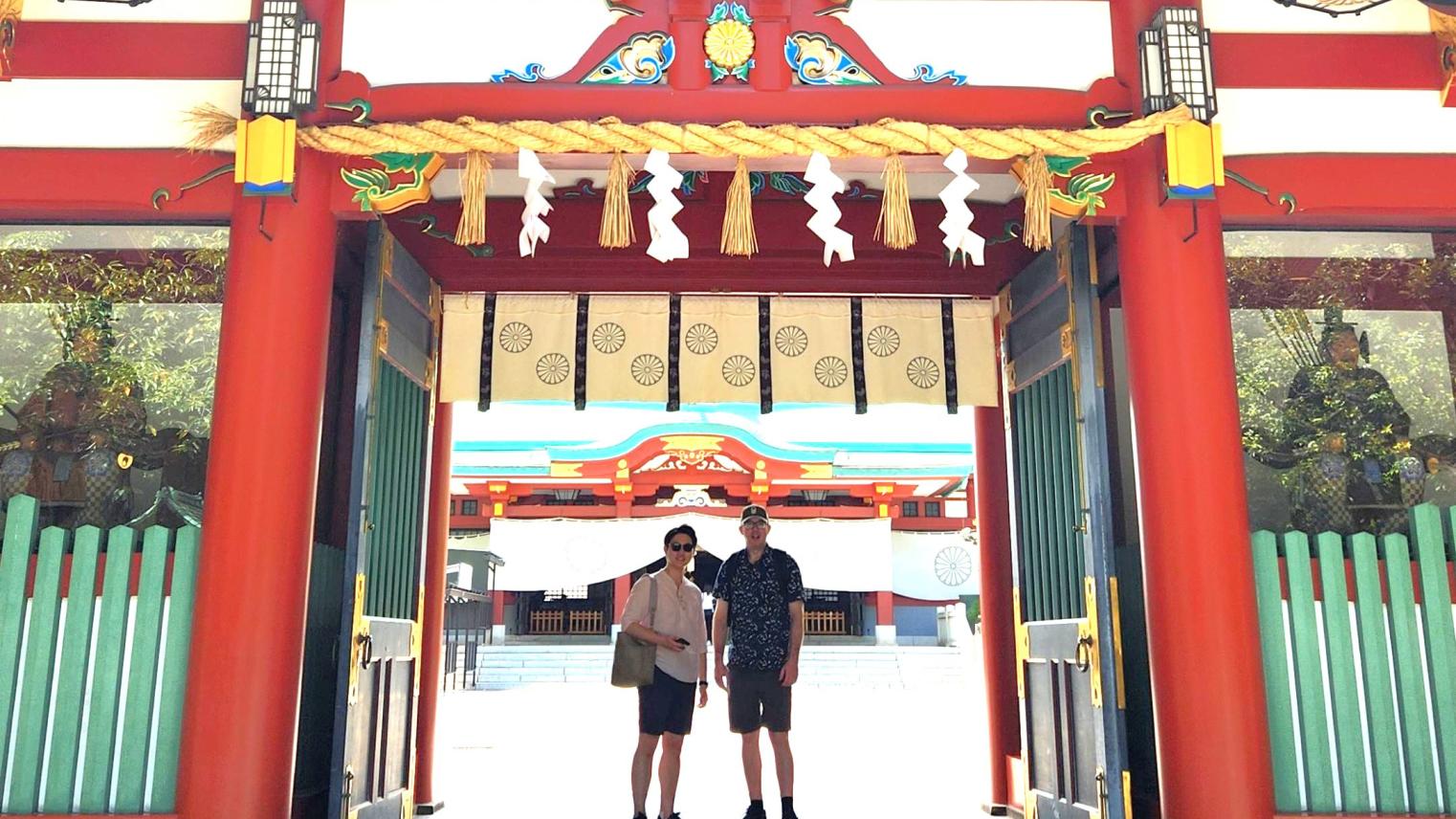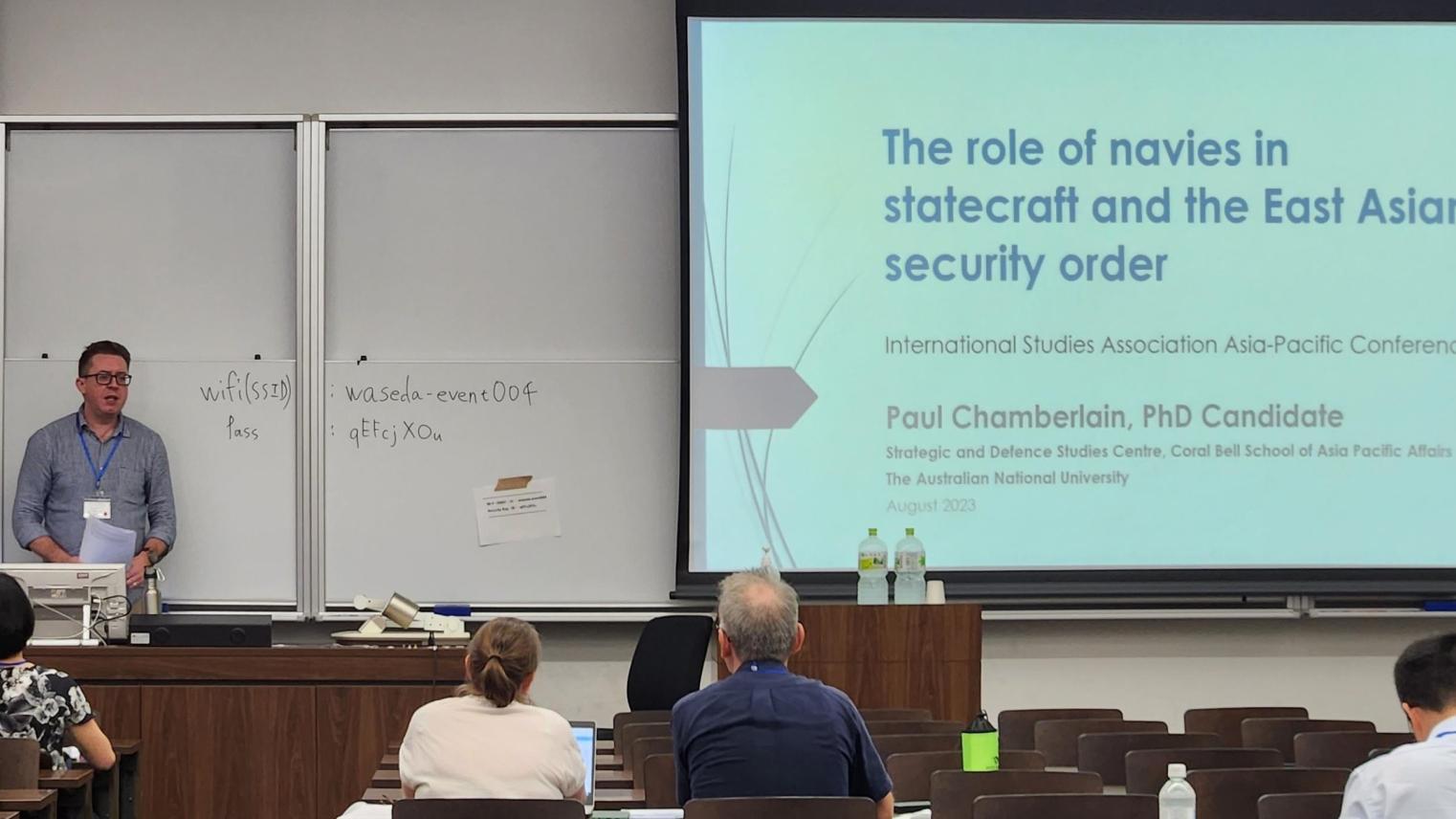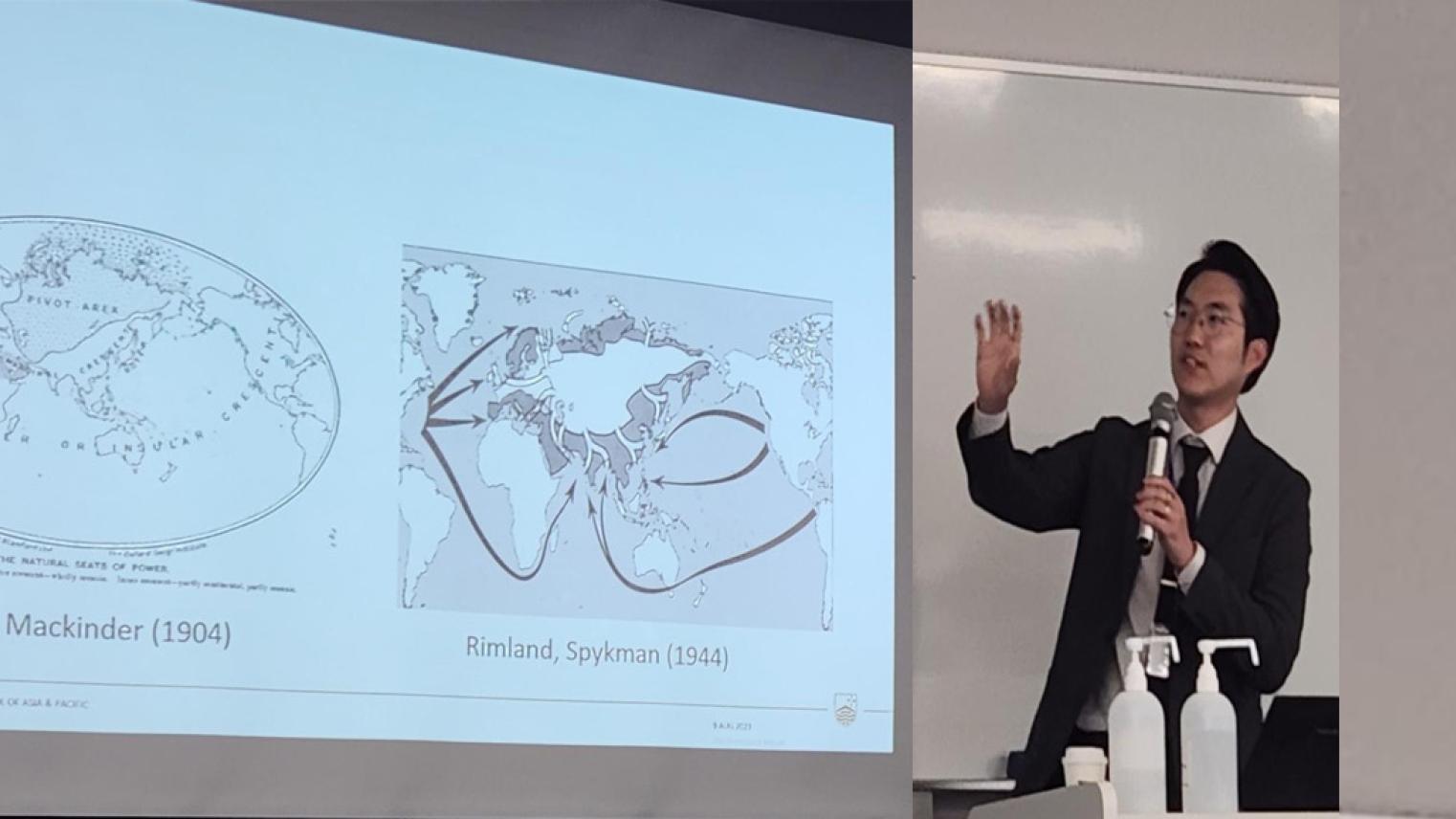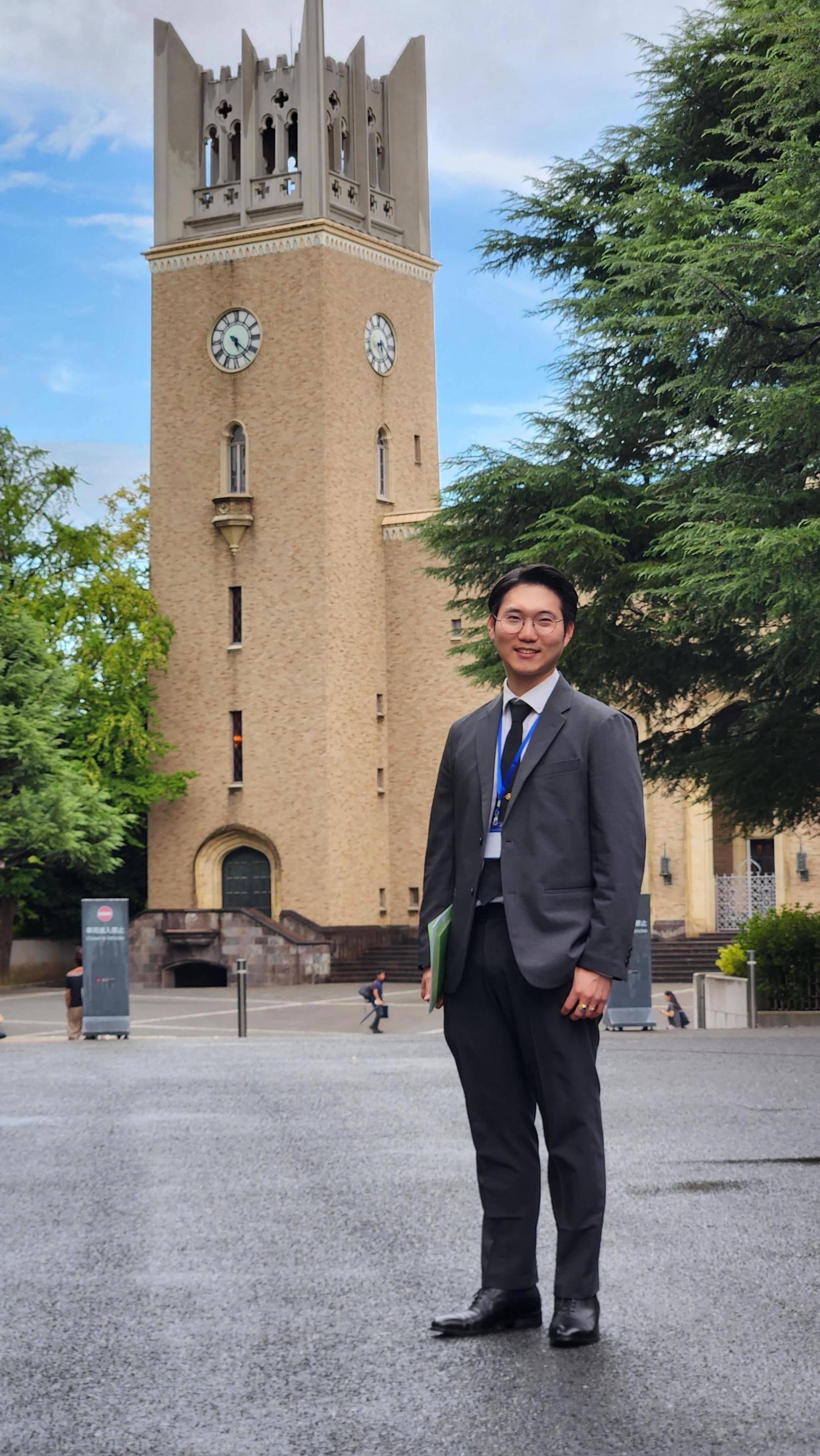Tokyo trip for two SDSC PhD scholars

In early August two of our PhD scholars made the trip to Tokyo to present at the International Studies Association Asia-Pacific (ISA-AP) Conference. ISA-AP is one of the most prestigious international conferences in the Asia-Pacific region.
PhD scholar Paul Chamberlain had presented at the previous ISA A-P in Singapore in 2019, when he was Policy Advisor to the Commander of the Royal Canadian Navy. He is now at the Strategic and Defence Studies Centre (SDSC), writing his thesis on the use of navies in statecraft in the East Asia, with Japan as one of the case studies. So, when he heard the next ISA A-P conference was to be held in Tokyo, Japan, he jumped at the chance.
He was also quick to share the news with his office-mate and fellow PhD scholar, Dongkeun Lee, who just happens to be a fluent Japanese speaker, and is writing his thesis on Sea Power in the Indo-Pacific. Dongkeun was previously an intelligence officer in the Republic of Korea Navy (ROKN) as a military diplomacy and foreign liaison officer at the ROKN Headquarters.
Paul Chamberlain and Dongkeun Lee are both PhD scholars in the Strategic and Defence Studies Centre (SDSC) in the Coral Bell School of Asia Pacific (Bell School), and both commenced their doctoral programs in Feb 2022. Dongkeun’s attendance at the conference was generously supported by an HDR travel grant from the ANU Vice-Chancellor, as well as PhD research support funds from the Bell School. Both Paul and Dongkeun’s supervisory panels were very supportive of their attendance at the conference.
One of the case studies in Dongkeun’s thesis is on Japan, so he was very keen to meet Japanese scholars and get to know them better. While he is originally from South Korea, and partially grew up in New Zealand, he speaks Japanese and was very keen to test out his language skills “in the field”. He was delighted to be told by native Japanese that they thought he must be living and working in Japan, as he spoke so fluently – albeit with an accent.
Both Paul and Dongkeun recognised the excellent fit between their thesis topics and the host nation of this esteemed conference - Japan. ISA-AP 23 was hosted by Waseda University, a beautiful small campus in central Tokyo, which Dongkeun said was a delightful place to escape the heat and humidity of Tokyo in mid-summer, especially the steamy intensity of crazy Shinjuku, just nearby.
The conference theme was fairly wide-reaching, seeking to tackle the conflicts and tensions arising in the Asia-Pacific region which require looking beyond historical hostility and parochial vested interests. As the conference website comments,
Overcoming regional and global challenges demands the Asia-Indo-Pacific’s urgent action and collective efforts, which are crucial for achieving a peaceful, healthy, and prosperous world.
The conference was attended by academics from across the Asia-Pacific region, obviously many Japanese, but also a significant Korean contingent. There were a few European and American delegates, but surprisingly little representation from Australian universities, aside from these two PhD scholars and Professor Beverley Loke from the ANU Department of International Relations, and two academics from Wollongong.
Dongkeun’s session was entitled “U.S. and War in Southeast Asia” and he presented on "The New Geopolitical Pivot: The South China Sea", with a chair from Taiwan, and a discussant from Thailand. For Dongkeun, this was his first opportunity to present his thesis to a broader international audience, to test his ideas in an international environment, and hear different perspectives on his approach. He received great feedback from the session chair and discussant, who provided input regarding potential Southeast Asian perspectives he might want to incorporate. The experience gave him the reassurance and confidence that he’s on the right path with his doctorate.
Paul gave a presentation on the role of navies in statecraft and the East Asian security order. His work seeks to analyse and explain the diplomatic effect of navies in East Asia from a systemic perspective, using the Strategic Diplomacy framework which was developed by his doctoral supervisors Professors Jochen Prantl and Evelyn Goh.
His session was chaired by a professor from Kobe University, and feedback encouraged him to incorporate the work of the Japanese Coastguard into his investigation of the overall ‘maritime policy’ of Japan. Delegates from the U.S. Defence Centre on Irregular Warfare were also interested in his analysis.
When asked by other conference delegates why he is studying the U.S. and Japan, and not the U.S. and China, Paul responded that …
Studying non-great powers might reveal more answers on systemic policymaking and the impact on order, as well as revealing their agency.
Overall the conference was a perfect opportunity to exchange ideas and perspectives with scholars from around the world. Both Paul and Dongkeun were able to connect with other scholars and build their networks, which solidified their sense of being part of a broader academic community of International Relations and Strategic Studies scholars.
They also had the chance to engage with delegates who were ANU alumni, having completed their studies and doctorates at ANU. They felt these encounters reinforced their sense of a broader ANU academic community, as an expansive academic network beyond Australia, and a kind of “umbrella” over the nurturing research environment at the Bell School.
Ultimately, this experience underscores the excellence and supportiveness of the Bell School PhD program, and the School’s exceptional academic community.
PRESENTATIONS:
- Dongkeun Lee's presentation - A New Geopolitical Pivot: The South China Sea
- Paul Chamberlain's presentation - The role of navies in statecraft and the East Asian security order


